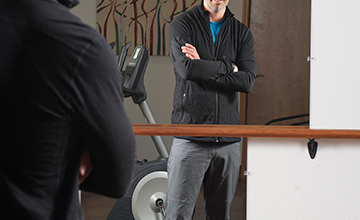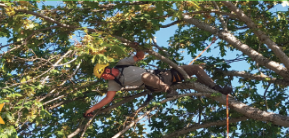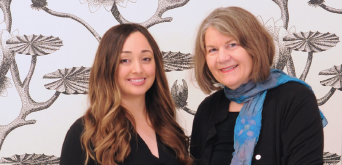Staying in the Moment with Grief
 It was a crisp Thursday morning like many we’ve had recently, when I headed out the door to meet with my friend Fayegail Mandell Bisaccia. We had been talking off and on for a few months about getting together to discuss her new book, dancing in My Mother’s Slippers: A Journey of Grief and Healing. Her book is an account of her grief and healing surrounding the death of her mother. It is a journey of sorrow, mindfulness and well-being.
It was a crisp Thursday morning like many we’ve had recently, when I headed out the door to meet with my friend Fayegail Mandell Bisaccia. We had been talking off and on for a few months about getting together to discuss her new book, dancing in My Mother’s Slippers: A Journey of Grief and Healing. Her book is an account of her grief and healing surrounding the death of her mother. It is a journey of sorrow, mindfulness and well-being.
Walking into Case Coffee Co. a few minutes early, I reviewed my short list of questions. My experience with grief is minimal. When it has come up in my life, I’ve usually packed it away as quickly as possible, rather than laying it out on the table for exploration. This day, however, would be different, because I was going to explore this vast frontier with Fayegail.
Naturally, I had an internal resistance to this kind of exploration. It’s similar to asking someone to write an article about happiness or sadness. How can anyone really capture and bring back the essence of these experiences? Fayegail would be my guide into the exploration of grief, healing and presence. If it weren’t for my complete confidence in Fayegail, I might never have taken advantage of the opportunity to glimpse the role grief plays in our day-to-day lives.
When Fayegail arrived, she greeted me with a warm hug, a bright glow and a beautiful smile (which you can see on this month’s cover). After she got settled, I asked her about the inspiration behind her new book, and what her goals were in creating it.
The book describes Fayegail’s journey from the time of her mother’s diagnosis, through the last year of her mother’s life and the five years until her father’s death. The book is about mindfulness, and about staying in the moment. It calls us to notice the familiar and unfamiliar experiences that come with grief, and to accept them without judgment. Fayegail wanted to share a model for a mindful grieving process. She would like for us, as a nation, to think and talk more about the grief we live with on a daily basis. For her, it’s the ‘little deaths,’ the small and not so small losses in life, which prepare us for the ‘big deaths,’ the deaths of people we love.
As I reached forward to check that my audio recorder was capturing our conversation, I pondered the idea that all these cumulative losses over a lifetime prepare us for the eventual big deaths. Fayegail was not talking about the distress associated with grief, as I had originally expected. Instead, she told the story of how grief had become a part of her life, and how she had been profoundly changed in the process.
Starting to glimpse what Fayegail was talking about, I asked her how she addresses death in her book. “I wanted to write a book about my day-to-day experiences, what it was like for me to go through the process of losing Mom, grieving and healing. I wanted people who are grieving to read the book and identify with what I’d written, and know they are not alone in their experience. I wanted them to know that grieving is a universal experience.
I thought about what Fayegail” had said earlier, about wanting us as a culture to think more about grief, and asked her what she feels is not happening in our culture with regard to grief. She said one of our culture’s biggest challenges is our denial of grief. Essentially, people can be walking around in a continuous state of grief and not realize it. Grief comes not only from losing someone to death. It can also come from all the losses we experience over time. Our pet dies, our library closes, our friend betrays us, we don’t get the job we want, our lover leaves us, our house burns down. All of these are occasions for grief. Our days are full of losses. Even when we do experience a death, the structure of our society doesn’t give us time to grieve. We take only a day or two off work. We’re afraid to make the people around us uncomfortable. Often we are told to get over it, or that time will heal.
My attention was drawn to the idea of a nation in grief. With all the war and atrocities occurring around the world, how could we miss it? Our denial discourages us from acknowledging our grief. I felt like I was missing something, so I asked her to describe the symptoms that point to a culture in grief. ‘Extreme fatigue, anxiety, anger, aggression, impatience, poor self-concept, self-pity, sadness, anxiety, self-doubt, inability to focus or to make decisions. Grief is not a negative thing; it’s part of the flow of life. But when grief tries to express itself and we shove it back inside, our resistance throws us off balance. Our resistance can make us suffer.’
Fayegail said that if we leave room for grief and allow ourselves to experience it without feeling embarrassed for doing so, it helps us live a more balanced life. If feelings of grief are not aired, we can be harsh, violent, lethargic, depressed, unmotivated, unsympathetic, unsupportive of others. Our health can be affected. Many people self-medicate with alcohol, drugs, overwork, busyness as way of escaping these powerful emotions.
When we pay attention to our grief, we live in the moment. ‘Life is a procession of emotional state’s laughter, tears, anger, passion. We need to remember that we do not stay stuck in one state of being. Once in a grief group, someone brought cookies and milk as a way of honoring her mom. We laughed and shared memories, and all the while, the grief was right there. At that moment we were laughing. Moments later, we were crying. If we watch closely, we notice that our sadness flickers in and out, and that other feelings are present in the spaces in between. Knowing this can be a tremendous relief. A lot depends on where we put our attention.’
I asked Faye ail what we can do in our daily life to deal with grief. She suggested taking a walk, talking things over with a sympathetic friend, working out, seeking professional help, meditating, practicing mindfulness. Sometimes traditional gender roles cause men and women to grieve differently. A man might dig a garden or fix something or solve a problem. A woman might talk with friends, share fears, focus on the emotional needs of people she loves. We must emphasize that these are stereotypic roles, and may be very different from what any particular man or woman experiences. Everyone grieves differently. There is no ‘right’ way to grieve, just as there is no magic length of time to grieve. It’s more critical that you do it than how you do it.
Bringing grief out into the open helps to prepare us to go on with our lives. We will never be the same person again, but grief can take us by the hand and slowly prepare us to re-enter the stream of life. Doing our grief work enables us to relate with our loved ones in a new way, even after death. It can help us discover a new richness in our time of transition.
It was at this point in our conversation that I realized that grieving is the process of living through these experiences and letting them go. If we don’t allow the natural process to occur, grief will shake us up until we have to pay attention. Our culture’s intolerance of grief sends us the ‘GET OVER IT’ message. But this isn’t about the culture’s acceptance of our grief; this is about our own opportunity for personal growth and transformation. We need to notice our own expectations’ of ourselves and others. When we begin to recognize how we grieve, we begin to experience a fluid state that is our natural response to living in the moment.
To learn more about Fayegail Mandell Bisaccia and her work, or to buy a copy of Dancing in My Mother’s Slippers: A Journey of Grief and Healing, visit her website at GriefandHealing.net. She also writes a blog at TheWeaverbird.blogspot.com. Visit with Fayegail at the Book & Author Fair, November 17, 10 am to 4 pm, at the Rogue River Room in the Stevenson Union on the SOU campus.




